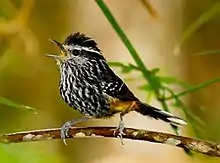Ochre-rumped antbird
The ochre-rumped antbird (Drymophila ochropyga) is a species of bird in the antbird family Thamnophilidae. It is endemic to Brazil, in the east and south east of the country in the Atlantic Forest Mountains EBA. It has fairly specific habita requirements, mostly being found in dense bamboo thickets and the thick understory of montane forest, and also more rarely in lowland evergreen forest, from 300 to 1,950 m (980–6,400 ft).[2]
| Ochre-rumped antbird | |
|---|---|
 | |
| Scientific classification | |
| Kingdom: | Animalia |
| Phylum: | Chordata |
| Class: | Aves |
| Order: | Passeriformes |
| Family: | Thamnophilidae |
| Genus: | Drymophila |
| Species: | D. ochropyga |
| Binomial name | |
| Drymophila ochropyga (Hellmayr, 1906) | |
It measures between 12.5 to 13.5 cm (4.9–5.3 in) in length. The plumage varies by sex. The male has a white throat with black streaks, a black head with a white stripe above the eye and streaked cheeks, grey back and blackish wings, black tail, rufous flanks and belly, and a light rufous rump. The female is similar but with buff streaks in the crown, olive-grey back and duller and less streaked front.[2]
The ochre-rumped antbird feeds on insects and other arthropods, foraging in pairs or in family groups forage from ground level to 3 m (9.8 ft) up into the trees. They are active foragers, hopping forward and then pausing to scan for prey, frequently flicking their tail as they do so.[2]
The species is still relatively common, but it has a limited range and specialised habitat requirements, and the species is in particular is vulnerable to bamboo die off.[3]
References
- BirdLife International (2012). "Drymophila ochropyga". IUCN Red List of Threatened Species. 2012. Retrieved 26 November 2013.CS1 maint: ref=harv (link)
- Zimmer, K. & Isler, M.L. (2017). Ochre-rumped Antbird (Drymophila ochropyga). In: del Hoyo, J., Elliott, A., Sargatal, J., Christie, D.A. & de Juana, E. (eds.). Handbook of the Birds of the World Alive. Lynx Edicions, Barcelona. (retrieved from http://www.hbw.com/node/56775 on 2 March 2017).
- http://www.birdlife.org/datazone/speciesfactsheet.php?id=4694
